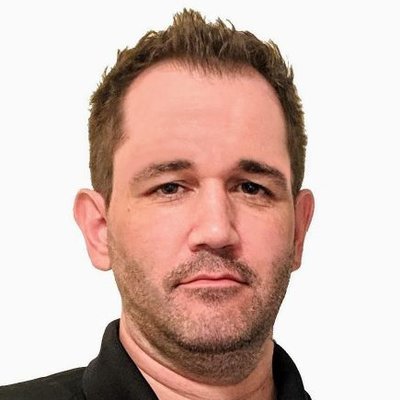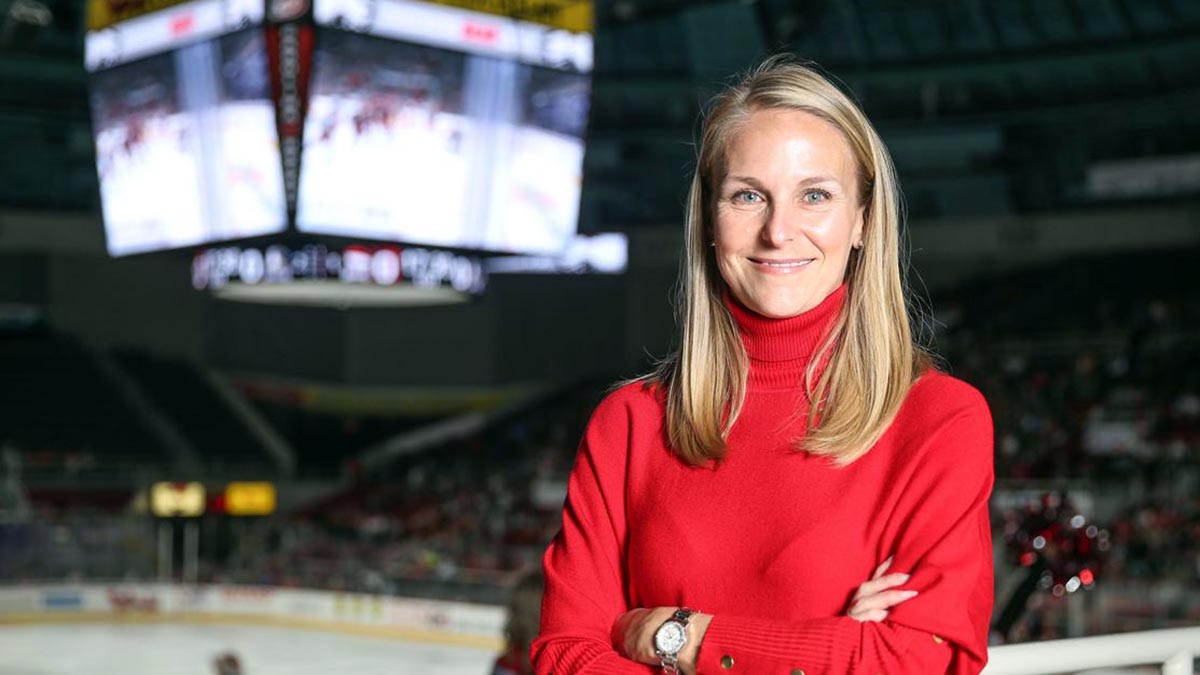In honor of Women’s History Month, this week TheAHL.com is featuring a multi-part series spotlighting women across the AHL.
📝 by Patrick Williams
Tera Black did not grow up anywhere near hockey, really, but she has built a life in hockey.
This is that classic story of a California kid whose first taste of hockey came via a San Jose Sharks preseason game in the early 1990’s before she broke into the then-burgeoning world of roller hockey as an athletic trainer, took on every job that needed to be done, shifted to the business side of the game, steered two pro franchises, won a Calder Cup, and became one of the top executives in the sport.
“I will say with 100 percent bias that it is the greatest game on earth,” Black said. “I couldn’t be more grateful for the game of hockey, for all the people that lifted me up my entire career, for my husband (Jamie, a former pro player and now the Checkers’ director of finance) who played the game and so carefully taught me the rules.”
As chief operating officer for the Charlotte Checkers, Black has built the club into one of the AHL’s top franchises. She came to Charlotte in 2006 to join the Checkers as their vice president when the organization was in the ECHL; she was promoted to COO two years later.
What exactly does a hockey club’s chief operating officer do? A little and a lot of everything, actually. Still an independently owned franchise, the Checkers’ day-to-day business operations are her responsibility. Folded into that work are the team’s sales, marketing, public relations, community relations, game operations and community efforts.
But go back to the mid-1990’s, a time when roller hockey became the next hot sport for a spell.
Especially in Black’s native California, where she was born in the ski resort town of Mammoth Lakes before moving to Grass Valley, not far from Sacramento, at a young age. Hockey had taken off when Wayne Gretzky came to the Los Angeles Kings in 1988. The Sharks arrived three years later. Black attended San Diego State University and found a job as an athletic trainer with the Sacramento River Rats, one of Roller Hockey International’s founding clubs. Playing a summer-based schedule, RHI found a foothold across several markets across California and the rest of the U.S. and Canada.
But RHI clubs ran extremely lean operations, and Black’s work quickly extended beyond the trainer’s room.
“It was sort of like a new frontier in terms of who was doing what and trying to put together staffs in a very short amount of time for the summer season,” Black remembered.
The River Rats needed an equipment manager.
“I wasn’t skilled at that,” Black said, “but I certainly became skilled very, very fast. I just said that I could do it. I would figure it out later.
“So that’s what I did.”
Then the team needed someone to head up its hockey operations, manage its travel, and more.
“When people needed somebody to do something, I just raised my hand as quickly as I could,” Black continued.
Those ever-increasing needs became a pattern.
There is a lesson in there as well. Take a chance. Take on a task that you may not have planned on doing. Step forward.
“I 100 percent stand behind that for navigating through an early career,” Black said of the approach. “Most things in this business, if you’re creative and resourceful and have people that are willing to kind of help you navigate, you can really learn on the job. Establishing your ‘board of directors’ — the people that will surround you throughout your career — is very important early on.
“Raise your hand and say, ‘I am not sure how I’m going to do it, but I’m absolutely going to do it.’”
So that is what Black did. Over and over, even if she looks back now and chuckles a bit.
“I think that now that I probably should have been a little bit more cautious about the things that I was volunteering to do, but I’m glad that I wasn’t,” Black mused. “‘Youth is wasted on the young,’ right? I think that helped me to say, ‘Yeah, I can do it.’”
Eventually RHI sputtered, but Black’s approach brought her back to San Diego where she joined the city’s ECHL franchise, known as the Gulls. They needed marketing and public relations work done, so that’s what she did. She took home an armful of awards in those departments, and soon became the team’s chief operating officer.
When the Gulls ceased operations in 2006, Black came east to Charlotte, where she was named vice president of the Checkers by new owner Michael A. Kahn. The Checkers organization had its sights set high, and Kahn had the right person to make those ambitions happen.
Black led the Checkers through several major projects. In 2010, the organization made the jump to the AHL, providing the league with a new home in one of the fastest-growing markets in the United States. She led the team’s 2015 move to Bojangles’ Coliseum — a facility better suited to hockey than the downtown home they were sharing with the NBA’s Hornets — including extensive renovation efforts needed to upgrade a 60-year-old facility that had lacked a main tenant for a decade. Now able to play in their own home and with a fan-friendly schedule, the Checkers prospered.
Black became the first woman to win the James C. Hendy Award as the AHL’s top executive. She was featured in Sports Business Journal’s “Game Changers” program spotlighting top female sports executives in 2016. A year later, Black earned the Charlotte Business Journal’s Women in Business Award. And when the Checkers captured the Calder Cup in 2019, Black became the first woman to have her name on the AHL’s championship trophy.
Black’s work extends far beyond Charlotte as well. The first team COO in the AHL, she is an alternate governor and became chair of the league’s Executive Committee last year. She also took on a key role with the AHL’s Return to Play task force established in 2020 to navigate the league through the earliest days of the COVID-19 pandemic and put in place the framework needed to stage the 2020-21 campaign.
After more than a quarter-century in hockey, Black sees more opportunities ahead for younger women now than back in her early days breaking into the game.
“I think it’s probably a little bit easier, because there’s such a willingness and pursuit of adding qualified females to all different types of sports and their staffs,” Black explained. “I think it’s probably easier to get an interview. Collecting experience is important, and there are more opportunities now than ever before. Every day that turns over, there’s another opportunity for females in sports.
“It’s a really great time for women to break into this industry. There are opportunities all over the place, and there’s definitely an eagerness by the people that are making the decision to fill roles with a diverse population, including women.”
And that is where that change in mindset can produce tangible results. Breaking into any profession requires a buy-in from people in those decision-making seats. Before Black’s quarter-century of success, she first needed somebody to take a chance on her coming out of San Diego State.
“A whole group of guys my entire career gave me an opportunity when it was their risk — they were willing to take on somebody who was probably less experienced,” Black recalled. “In this day and age, it’s not even taking a chance. There are so many college programs, sports management programs, and athletic training programs that are so highly specified to each individual sport that girls and women are coming out of college really qualified and can go toe-to-toe with the guy in the room that’s interviewing for the same position.”
Black brings her advice back to Sacramento.
“I tell this to every person who asks me, whoever I’m mentoring… You need to be super-diversified, because you never know,” Black said. “If you’re an athletic trainer, but then a graphics position comes up and you need to throw together a presentation, suddenly you have that experience and a different type of skill set. Sometimes that doesn’t follow the path of a traditional four-year college degree, right? You may want to go get experience in all different types of businesses so that when those opportunities come up, you’re ready.
“There’s a quote on my wall in the office,” she continued. “It says that earning a great deal of money does not necessarily make you rich. The experiences that you collect over your lifetime build a life. I have been lucky enough to make a living at it but also have the most remarkable set of experiences that have led me here today.”
Black may not have grown up with hockey, but her hockey experiences have helped to build a life.
“It’s an absolute privilege to be where I am and to have the experiences that I have had,” Black said. “I couldn’t do what I do today without all of the experiences that came before it.
“That’s where it’s so critical to say, ‘Yes.’”
TheAHL.com features writer Patrick Williams has been on the American Hockey League beat for nearly two decades for outlets including NHL.com, Sportsnet, TSN, The Hockey News, SiriusXM NHL Network Radio and SLAM! Sports, and was most recently the co-host of The Hockey News On The ‘A’ podcast. He was the recipient of the AHL’s James H. Ellery Memorial Award for his outstanding coverage of the league in 2016.







































